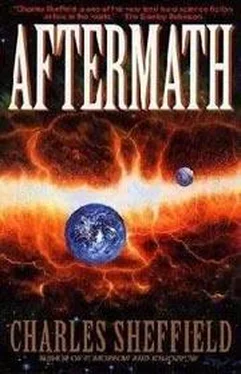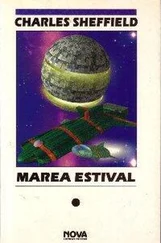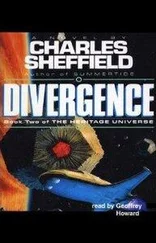“Yes, but tell me again.” She was half smiling, the tips of her teeth just showing. “This time it will be different.”
Saul picked up his glass, peering into its ruddy crystal ball. “Maybe it will. Maybe it will. I was born the year after men first landed on the moon. My father worked at Lewis Research Center, one of the facilities of the old NASA. Space exploration was his life. If my mother hadn’t put her foot down, my name would be Saul Armstrong Aldrin Collins Steinmetz. He was sure that we would have a colony on Mars by the end of the last century, that by now we’d be settling the Jupiter system and beyond. He didn’t realize — ever — that the space program had been born ahead of its time, as a political stunt.
“He died in 1999, when he was sixty-five. That was young to die, even then. What happened in the seventies, eighties, and nineties broke his heart. When I was twenty he was my age now, but he was a sad, disheartened old man. He would sit on the porch and reminisce about the sixties, what he called the ’Golden Age’ of space exploration.
“He didn’t live long enough to learn that the Golden Age was in the future, not the past. When people first went into space it was a balancing act where you might fall over anytime. Every component was stressed to the limit, just to get to orbit and back. The pioneers had all the courage in the world. What they didn’t have were good computers, molecular machines, and designed construction materials.
“Worst of all, they didn’t have the right energy sources. Nuclear power is the key to space, but it was ruled out for forty years by the 1963 Test Ban Treaty. Can you imagine riding a chemical explosion to orbit? That’s what the designers were told to use, chemical reactions with one-millionth the energy of nuclear reactions. It’s as though you called in the world’s best bridge builders and said, we want you to build bridges across the San Francisco Gate, or Sydney Harbor, or the Verrazano Narrows. We’ll give you money — though not quite as much as you need. And oh, yes, there’s one other point. You’ve got to use wood as your building material. We know about iron and steel and aluminum, but for social reasons they are unacceptable.
“So the astronauts and cosmonauts were hurled into space using chemical rockets. There was no margin for error. And most of them lived, and a few of them died, and people like my father faded into despair. By the time the revised outer space treaty was signed in ’05, it was too late for him.”
He was lecturing, to Tricia who either knew it already or didn’t need to. She didn’t seem to mind. She was leaning forward, food and drink forgotten. It was one of her most endearing aspects. When she was your partner she focused her attention on you and you alone, as if there were no other people in the world.
Except that she wasn’t his partner, not now and not for more than two years. She was married to Joseph Goldsmith. Saul ought to be asking what she was doing here tonight rather than dwelling on his own obsessions.
She was nodding at him eagerly. “Go on, Saul. I’m listening. If you are worried, I want to hear.”
“I am worried, but more than that I’m thinking I’m a lucky man. I always told myself that I was so different from my father. Now I realize I’m just like him. He spent decades pining for the space program that seemed within reach when he was twenty-five years old. It didn’t happen, not in his lifetime.
“When I was twenty-five, I had my own vision. The whole world was going to be one, tied together by electronic information transfers. I wondered when I would find time to sleep, because the financial deals I wanted to follow around the world were in every time zone. I knew the markets by heart, and all their hours of opening and closing: Auckland, Sydney, Tokyo, Seoul, Beijing, Jakarta, Rangoon, Bombay, Karachi, Tehran, Beirut, St. Petersburg, Cairo, Cape Town, Rome, Paris, London, Rio, Buenos Aires, Santiago, New York, Toronto, Chicago, Houston, Mexico City, San Francisco, Honolulu. I zigzagged north and south while moving west with the sun, hemstitching the world. I was sure what the future held, and it meant that I had to be everywhere.”
Saul paused. “I’m sorry, Tricia, you know all this stuff. I’m babbling at you. It’s the wine.”
But it wasn’t the wine. It was Tricia’s eyes, intent on his, signaling that he was telling her the newest, most important, most fascinating information in the world.
“Go on, Saul.”
“Well, I’ll keep it short. My future didn’t happen, either. The Turnabout Riots happened instead. Fears of invasion of privacy, return to real currency, the mektek factory revolt, the jobs-for-humans movement, refusal to accept electronic data. This country led the retreat. I felt twenty years ago as my father must have felt fifty years ago. My future was destroyed. I went into politics to try to save it.
“I failed here at home. But other nations and strategic alliances moved ahead while we seemed to be stuck, going nowhere.
“Now I imagine what would have happened to this country if I had succeeded. We would have been twenty more years down the road to a total electronic culture. Supernova Alpha would have done to us what it did to the Golden Rim and the Sino Consortium, every element of the economy ruined.
“I totally believe what I’m going to say now, although I can never suggest it in public: the Turnabout Riots were the best thing that ever happened to this country. We could be infinitely worse off. And we would have been — if my future had happened.”
Saul studied his glass. He didn’t remember drinking from it, but again it was empty. Three-fourths of the bottle of Cabernet Sauvignon was gone. He wondered if he was boring Tricia, despite her apparent rapt attention. He was certainly talking too much. More than he had ever intended to. He turned to her.
She read it as an invitation to speak, but her response surprised him. “Do you think there is any way that the supernova could make someone go insane?”
“Not that I can imagine. Who’s the person?”
“Joseph. My husband.”
“I know who your husband is.” It occurred to Saul that in fact he knew little about her husband beyond his name, and that he disliked the man for the good and at the moment sufficient reason that Joseph Goldsmith had Tricia, and Saul did not. Of course, she must have somehow agreed to the arrangement, but that was not the point. The point was that Tricia was really his, not Goldsmith’s.
He had the sense not to mention this. Instead he said, “How old is he?”
“He’s fifty-six.”
“Joseph Goldsmith is fifty-six? But that’s my age!”
She laughed at him, the throaty chuckle that he liked so much. “I know. I’m told that more than one person can have it. But you are in much better shape than he is.”
“He’s too old for you. Why do you think he might be going mad?”
“He won’t leave the house. He won’t even come out of the basement. He says there are rays from the supernova that will sterilize him.”
“That’s news to me. My scientific advisers have said a lot of things about the supernova, but not that.”
“Joseph doesn’t take any notice of scientists. He’s quite well off, you know.”
It was like saying that Hitler was not altogether a nice chap, but Saul just nodded.
“He’s planning to have deeper and deeper levels dug,” Tricia went on. “Under the house, so we can go down there and save ourselves from the rays. There’s no way he could be right, is there?”
“He sounds insane.”
“I think he is. He wants me to stay down there with him. But I won’t.” Tricia popped to her feet, went across to the side table, and poured the remainder of the bottle of white wine into her glass. She drank it in two gulps, returned, and leaned over to run her wet tongue over Saul’s ear. “Hearing you say that is a big load off my mind.”
Читать дальше












